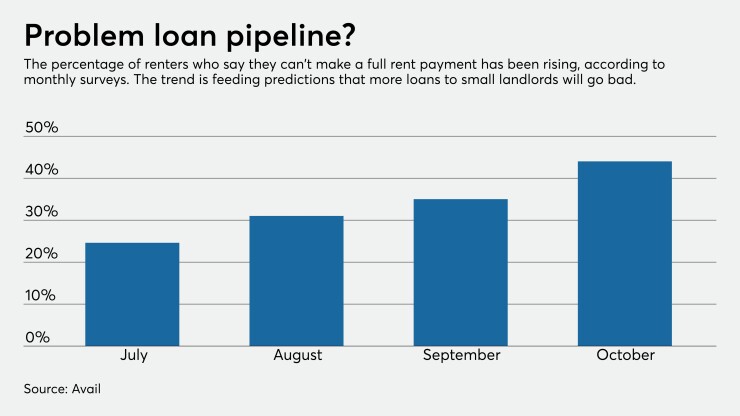Dawn Garza, a landlord and small-business owner in San Antonio, is hoping to get a second loan from the Paycheck Protection Program to cover her property taxes due at the end of January.
She’s short because business is down, and she gave her tenants — one a student and part-time restaurant worker, and the other an out-of-work hairdresser who is recovering from COVID-19 — a three-month break on rent this year.
“I am not going to ask for back rent because I know it's impossible for them,” Garza said.
The stimulus package enacted in December extended the Centers for Disease Control and Prevention’s moratorium on evictions through Jan. 31 and granted renters other relief. But for many landlords the mortgage payments are still due, a reality that translates into a looming credit risk for banks.
About 1.6% of an estimated $1.6 trillion market for mortgages on 1- to 4-unit properties were delinquent in November, holding steady from the previous month, according to the Mortgage Bankers Association. But delinquencies are expected to climb.

Chris Nichols, chief strategy officer for the nearly $19 billion-asset CenterState Bank in Winter Haven, Fla., said banks have been working closely with landlords to restructure their debt and provide forbearances, but this relief will expire soon and is a concern. Defaults on rental properties are typically caused by mismanagement or economic downturns that are easier to gauge.
“Since none of us have been through a pandemic this large before, there is no playbook and few alternatives,” Nichols said.
Nichols estimates that banks will see a peak in these delinquencies in the fourth quarter of 2021. The delinquency rate could climb a full percentage point to the mid-2% range in some markets like New York and Chicago, Nichols said, and lenders could be dealing with these problem loans for up to two years.
“Small landlords are getting hit hard with no real way out of the problem until the pandemic ends,” Nichols said.
Nearly eight in 10 landlords surveyed by the Chicago property technology company Avail reported having a mortgage on their rental property. Unlike large multifamily corporations that have access to financial markets and investors to plug holes when renters fall behind and eviction bans are in place, these mom and pop landlords depend on using rents from their tenants to cover their mortgage and property tax bills.
Moody’s analysts have recently estimated that about $70 billion in back rent is past due.
The stimulus package included $25 billion in rental assistance that states could funnel through renters up to their landlords to cover some of the shortfall. The package also provided $600 checks and $300 in additional unemployment benefits.
It’s uncertain when the rental assistance will make its way to those who need it, but it is clear that it won’t be enough.
“It is hard to estimate how long renters will be out of work, but we are seeing stronger than expected pushback on the vaccine, which is resulting in extended delinquency projections into late 2022,” Nichols said. “At its current pace, more than $100 billion could be required.”
Rick Sharga, executive vice president of marketing at RealtyTrac, which tracks foreclosure data, said the stimulus package was needed to prevent a “catastrophic failure” in the rental market. Foreclosure activity for now is only a trickle, but it is expected to pick up in the sector before the pandemic and its recession end, he said.
“I do believe that if the eviction bans are extended much longer, and continuing unemployment rates remain high, we’ll begin to see smaller investors, who are often highly leveraged, begin to default on their loans,” Sharga said.
The number of renters falling behind is increasing. An estimated 44% of renters surveyed by Avail in October said they did not expect to make a full rent payment that month, up from 35% the previous month.
The company is expected to announce its latest survey data later this week.
While an outright foreclosure is avoided, roughly 57% of landlords who did not receive full rent payments reported feeling pressure to sell, according to the Avail survey.
Banks’ handling of the situation could have implications beyond the financial system.
“Because rental properties owned by mom and pop landlords are generally more affordable than those owned by institutional investors, this pressure could cause the housing market—which already had a dearth of available units before the COVID-19 pandemic — to lose even more lower-priced rental housing,” researchers at the Urban Institute said in a recent paper regarding the Avail data.
Since Garza also runs a small business out of her property, her mortgage is backed by the Small Business Administration, which gave her some relief on the loan. Congress’s latest stimulus package includes a new round of PPP lending, which she is ready to apply for.
“Things like this happen when everything is barely holding together,” Garza said. “We had hoped for more stimulus money, but we’re now hoping for a PPP loan knowing things can get bad real quick.”





